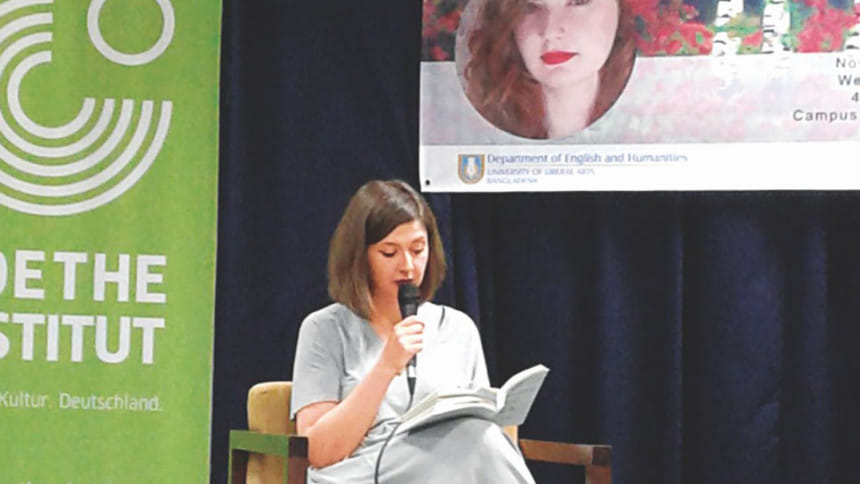When Olga Grjasnowa Comes to Dhaka

I met Olga Grjasnowa early this November when she came to a program at ULAB jointly hosted by the University and the Goethe Institute Bangladesh. She had a couple of sessions at the Dhaka Literary Festival too. When I first heard the name Gryasnowa, I pictured her as an elderly lady in her sixties. Imagine my surprise when my Google search rendered a lovely face with an enchanting smile. The face appeared more attractive in person with twinkling eyes, a ready wit and sensitive mind added to it.
Born in 1984 in Baku, Azerbaijan, Olga grew up in the Caucasus, and has lived in Poland, Azerbaijan and Israel. She moved to Germany the age of 12 with her parents. Her father, a Russian immigrant, practiced law, and her mother, whose passport showed her to be of Jewish origin, was a piano teacher. When asked if she ever dreamt of becoming a pianist, Olga shook her head and replied, "It was not possible; I was stone deaf in recognizing the notes." She grew up in a house full of classics and naturally claims writing to be a byproduct of reading. A graduate of the German institute for Literature/Creative Writing in Leipzig, Olga exclaimed half laughing that her father realized too late that she was a student in the writing program. He had thought that she was studying Arts and Sciences and preparing to enter medicine. But even Olga herself had not imagined that she would become a writer and instead considered journalism as a profession. She replied shyly to my question why she never thought of writing: "I thought I was not good enough." And in 2010, she was awarded the Dramatist Prize of the Wiener Wortstätten for her debut play, Mitfühlende Deutsche (Compassionate Germans). All Russians Love Birch Trees, which too won awards, is her first novel.
German is the language in which Olga Grjasnova's writes. But she only claims to be half German and an author of immigration. She is conscious that because she is white, she has oftrn been placed before other immigrants who are not white. "I am privileged," she claimed more than once, and not with pride. Like her, the characters in her novels too, are conscious about displacement and injustice in society. She is perhaps one of those writers who can claim to be a product of transnationalization. Identity for these writers has indeed taken on a new shape in a world that is rapidly changing. Right now, there is an incredible discussion under way in Germany about the concept of a "homeland." Most Germans associate "homeland" with happy memories at a particular place where one lived in childhood or went to school and had happy memories. But in political discussions, "homeland" becomes something to be protected from outsiders.
While trying to explain the muddled concept of "homeland," Olga spoke briskly, "I am still not clear about which 'homeland' is referred to here: Germany has distinct regions and when one speaks of German culture, one is compelled to ask what exactly this means. For example, local culture in Hamburg is very different from local culture in Berlin. I myself have become a part of German society in the state of Hesse; in other words, Germany for me is Frankfurt followed by Berlin. And perhaps Hamburg as well, I like the city too."
As Olga claims, even though about 40% of the dwellers of most big cities in Germany are foreigners and immigrants, the immigration policy is not very friendly. She laughed derisively as she pointed out how Jewish people still occupies the bottom rank of the social identity. Married to a man with Syrian passport, Olga surely has felt the brunt of segregated identity. She shook her head when asked about hers and exclaimed, "That I was born in Azerbaijan plays no role when it comes to my identity. In daily life, I cook a traditional dish at most twice a year and that's about it. I speak Russian but that again is a different matter, a different cultural heritage." She paused and then added, "Right at the moment I am more concerned by the fact that I am a mother of two small children and I believe that affects my identity most."
I asked her about the reason behind the title of her first novel and she laughed and said, "It was meant to be a joke. But afterwards I realized that Russians are actually very serious about birch trees, and the statement proved to be true."
My last question to Olga Grjasnowa was about her writing technique. With a habitual shake of her head she replied, "I don't really remember much of my previous books. When I write, it is like a research. I spend much time in learning about the country, culture, language and people before putting them together on page. I become truly engrossed in my writing. But once I am done, I leave them behind and get ready for my next project."
Sohana Manzoor is Assistant Professor at the Department of English & Humanities at ULAB. She is also the Editor, Star Literature & Reviews Pages.

 For all latest news, follow The Daily Star's Google News channel.
For all latest news, follow The Daily Star's Google News channel. 



Comments